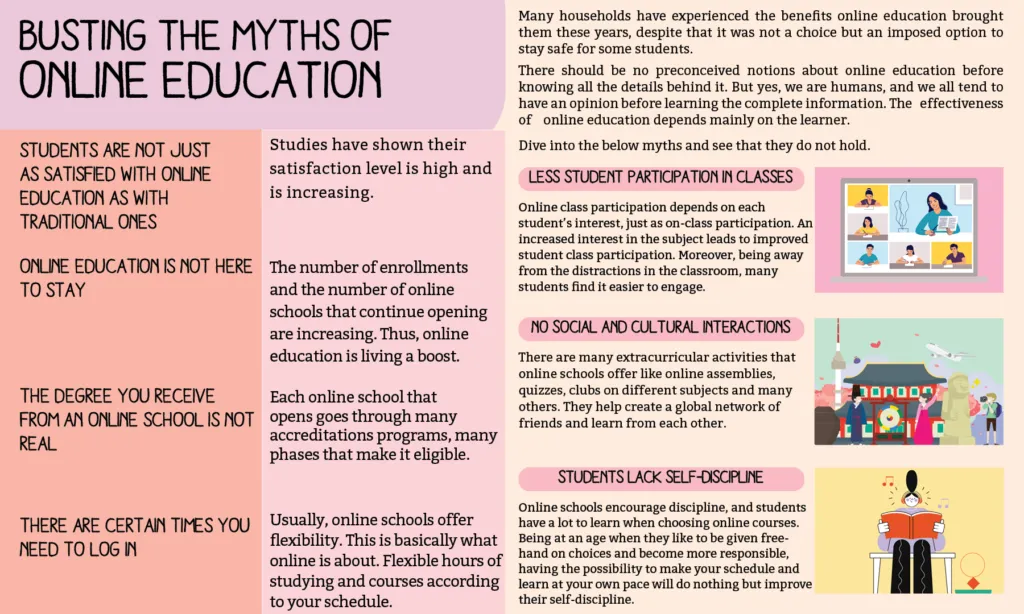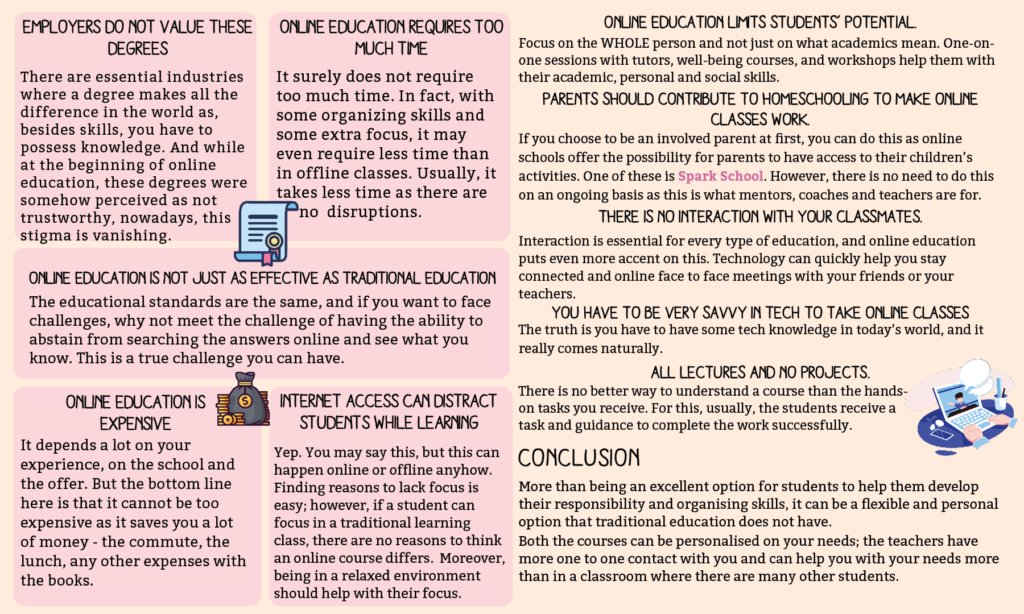Many households have experienced the benefits online education brought them these years, despite that it was not a choice but an imposed option to stay safe for some students.
You may think that we have already got accustomed to online education, and there are no doubts about its efficacy, clarity and many other aspects. However, we are not there yet. Thus, we are trying to bust the myths surrounding online education and offer you clarity on the subject.
Researches show that online education is rising, and students like it.
Despite this, there are some concerns from both students and parents part.
There should be no preconceived notions about online education before knowing all the details behind it. But yes, we are humans, and we all tend to have an opinion before learning the complete information. The effectiveness of online education depends mainly on the learner.
Dive into the below myths and see that they do not hold.
Online education myths
1. Students are not just as satisfied with online education as with traditional ones.
Students are thrilled with the online method of education. Studies have shown their satisfaction level is high and is increasing.
2. Online education is not here to stay.
The number of enrollments and the number of online schools that continue opening are increasing. Thus, online education is not going away any time soon. It is living a boost.
3. The degree you receive from an online school is not real.
This is one of the myths most parents worry about. As the amount of money spent on an online school may be higher, they need to know that this spending is not in vain. However, any online school that wants to function needs accreditation. Moreover, each online school that opens goes through many accreditations programs, many phases that make it eligible.
4. There are certain times you need to log in.
Usually, online schools offer flexibility. And this involves the hours that students need to be online. You do not have to log in at the same time your colleagues do. This is basically what online is about. Flexible hours of studying and courses according to your schedule.
5. Less student participation in classes.
Online class participation depends on each student’s interest, just as on-class participation. An increased interest in the subject leads to improved student class participation. However, since online classes may be new for some, teachers try to make them as interactive as possible, in some cases more interactive than an in-class course. And this helps with students’ participation in classes as well as with the understanding of the course. Moreover, being away from the distractions in the classroom, many students find it easier to engage.
6. No social and cultural interactions. (Katherine Guevara et al., 2021, Busting Myths in Online Education)
There are many extracurricular activities that online schools offer. Some of them are online assemblies, quizzes, clubs on different subjects and many others. These live encounters help students socially interact with their colleagues and peers, create a global network of friends and learn from each other.
7. Students lack self-discipline.
Online schools encourage discipline, and students have a lot to learn when choosing online courses. While at first, they may need to be guided by mentors or teachers or even parents, they will know how vital self-discipline is. Being at an age when they like to be given free-hand on choices and become more responsible, having the possibility to make your schedule and learn at your own pace will do nothing but improve their self-discipline.

8. Online education limits student potential.
Focus on the WHOLE person and not just on what academics mean. Most online schools today support students to discover and develop their full potential. One-on-one sessions with tutors, well-being courses, and workshops help them with their academic, personal and social skills.
9. Parents should contribute to homeschooling to make online classes work.
If you choose to be an involved parent at first, you can do this as online schools offer the possibility for parents to have access to their children’s activities. One of these is Spark School. However, there is no need to do this on an ongoing basis as this is what mentors, coaches and teachers are for. The software used is very good and helps students tackle their needs.
10. There is no interaction with your classmates.
Interaction is essential for every type of education, and online education puts even more accent on this. Technology can quickly help you stay connected and online face to face meetings with your friends or your teachers. Author Allison Bruning says her class was instructed to check the forum boards frequently in her online program. “The more we interacted, the more connected I felt with my classmates.”
11. You have to be very savvy in tech to take online classes.
The truth is you have to have some tech knowledge in today’s world, and it comes naturally.
12. All lectures and no projects.
There is no better way to understand a course than the hands-on tasks you receive. Hands-on work is often used in online education. For this, usually, the students receive a task and guidance to complete the work successfully.
13. Employers do not value these degrees.
There are essential industries where a degree makes all the difference in the world as, besides skills, you have to possess knowledge. And while at the beginning of online education, these degrees were somehow perceived as not trustworthy, nowadays, this stigma is vanishing. The reasons range from the high-quality courses online education offers to the fact that some company owners opted for online education.
14. Online education requires too much time.
It surely does not require too much time. In fact, with some organizing skills and some extra focus, it may even require less time than in offline classes. Usually, it takes less time as there are no disruptions.
15. Online education is expensive.
It depends a lot on your experience, on the school and the offer. But the bottom line here is that it cannot be too expensive as it saves you a lot of money – the commute, the lunch, any other expenses with the books. If you take all these into account, you may just see that the costs are not very much higher.
16. Online education is not just as effective as traditional education.
The fear that classes are too easy and you will not learn to face challenges and solve them is real. However, there is nothing further from the truth. The educational standards are the same, and if you want to face challenges, why not meet the challenge of having the ability to abstain from searching the answers online and see what you know. This is a true challenge you can have.
17. Internet access can distract students while learning.
Yep. You may say this, but this can happen online or offline anyhow. Finding reasons to lack focus is easy; however, if a student can focus in a traditional learning class, there are no reasons to think an online course differs. Moreover, being in a relaxed environment should help with their focus. 
Our thoughts on online education
More than being an excellent option for students to help them develop their responsibility and organising skills, it can be a flexible and personal option that traditional education does not have.
Both the courses can be personalised on your needs; the teachers have more one to one contact with you and can help you with your needs more than in a classroom where there are many other students.
With all the technology improvement, they can view easier a student’s progress and see where that student needs more support.
Conclusion
As with each education style, online education needs a child interested and eager to learn. Without this basic, neither traditional nor online education can help students learn. One thing that conventional education can do is to create a must for him to pass the class, to go to school, to have a diploma – and this sometimes may be bad – the only take that child may have is the diploma, and no knowledge to help in life.




